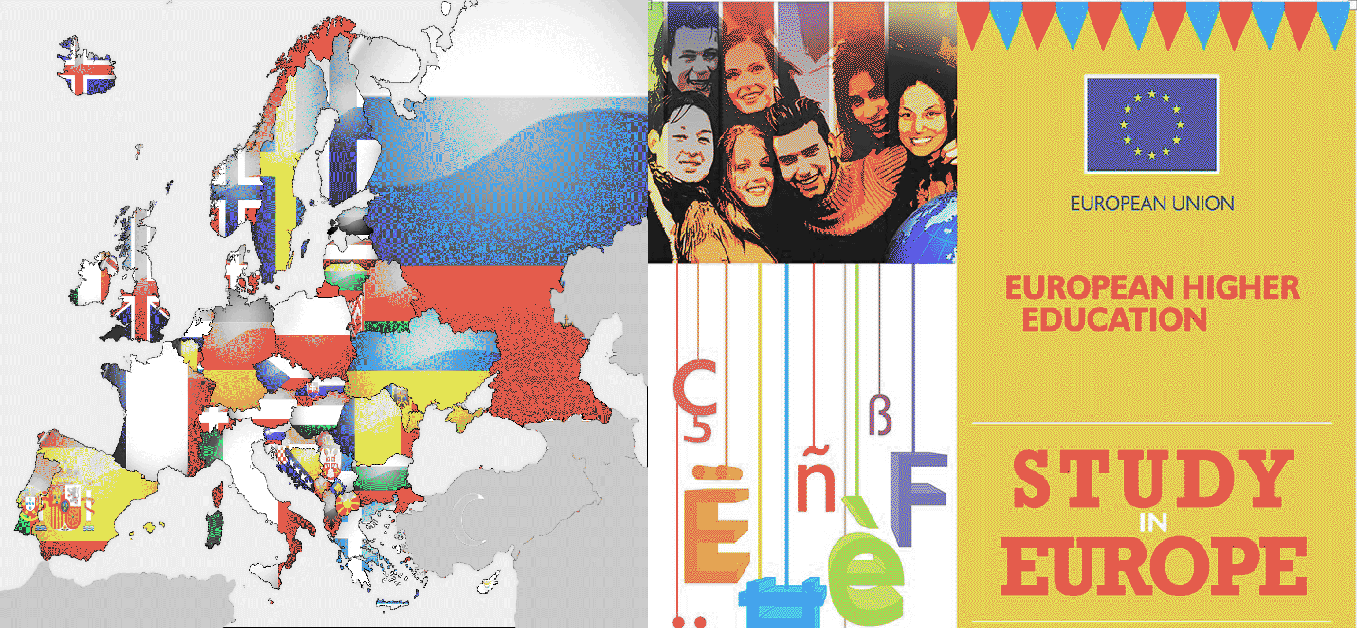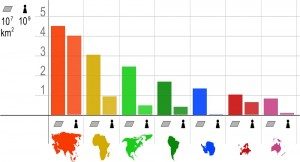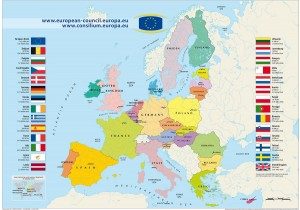
1. Europe Is the World’s Second Smallest Continent
The current size of Europe is 3,930,000 square miles. Europe is the world’s second smallest continent. It covers approximately 2% of the Earth’s surface. Australia is the world’s smallest continent and Asia is its largest.
Area and population by continent
2. There Are 50 Countries in Europe
Europe facts tell us there are 50 countries in Europe, including the world’s smallest country, Vatican City. The most visited countries in Europe are France, Spain, Italy, the United Kingdom, and Germany.
Europe is home to five transcontinental countries that straddle the border between Europe and Asia. These countries are Azerbaijan, Georgia, Kazakhstan, Russia, and Turkey. It’s interesting to note that even though only part of Russia is on the European continent, it is still the largest country in Europe. Russia isn’t the only transcontinental country of note – Turkey happens to be the home of the largest European city, Istanbul.
3. 28 European Countries Are Members of the European Union
The European countries don’t just share a continent and borders – they’ve also made many political and economic ties. Europe facts indicate the Council of Europe has 47 member states. Its focus is on democracy and human rights. It cannot make binding laws, but works to create standards for human rights in Europe, among other things. Belarus, Kazakhstan and Vatican City are not members of the Council of Europe.
Twenty-eight European countries have joined together to become the European Union. The European Union makes binding laws that serve to advance the economic and political goals of the area. Nineteen of the member states even use the euro as their currency.
4. The Name Europe Comes from Greek
Europe facts tell us the name Europe is believed to have derived from Greek. Europa was a princess in Greek Mythology. Homer also wrote of a Queen named Europe. Later, in 6 BC, Greek geographers used Europe as a geographic name. The modern understanding of what we know of as Europe was developed in the 19th Century.
5. Europe Gave Birth to Western Civilization
Europe has a unique claim to fame: it is the home continent of the Greeks who founded Western civilization. We can thank these early Europeans for democracy, philosophy, history, drama, verse, medicine and science.
6. Europe Has a Christian Majority
According to the Pew Foundation, about 5% of Europe’s population is Muslim. This accounts for only 2.4% of all Muslims worldwide. Even though only 5% of the population of Europe identifies as Muslim, Islam is the second largest religion in Europe. In contrast, Europe is home to 26% of the world’s Christians. 76% of Europeans identify as Christian, making this the most popular European religion. Europe facts show that 18% of Europeans are not affiliated with any religion.
7. European Cities Draw Curious Tourists
European cities are popular with tourists. Their rich cultural history makes them great destinations for art, food and history lovers. Paris is the most popular urban European destination. Barcelona, Rome, London and Berlin round out the top five European cities for tourism. The cities of Europe provide a rich experience, with museums, restaurants, and tours that cater to curious travellers.
8. World War I Ended Four European Empires
Europe has seen numerous wars among its constituent countries, but World War I drew countries from outside the continent. Most of the fighting during World War I was focused in Europe. It became a war of two sides: the Allies and the Central Powers. Initially, the Allies included the United Kingdom, France and Russia. The Central Powers were Germany and Austria-Hungary. Eventually, more countries joined these alliances, including the United States and Japan.
World War I was one of the largest wars the world has seen. World War I ended the German, Russian, Ottoman and Austro-Hungarian empires and led to a new map of Europe. The war also led to the formation of the League of Nations, which would set the foundation for the formation of the United Nations.
9. World War II Was the World’s Largest War
Unfortunately, World War I left some European countries in turmoil. Twenty-one years later, a new war broke out; one that would become the largest war in modern history. Europe facts tell us World War II was the deadliest war on Earth and featured over 30 countries embroiled in combat over four continents.
World War II featured the Allies and the Axis as opponents. The Allies included the United Kingdom, Russia, Greece and the United States, among others. The Axis powers were formed by Italy, Japan and Germany. The Allies eventually triumphed over the Axis powers, leading to the sectioning of Germany into two parts and the formation of the United Nations as an international regulatory organization.
10. Several Popular Mountains Take Europeans to New Heights
Europe features numerous mountain ranges. The tallest mountain in Europe is Mount Elbrus in Russia. Popular mountain ranges include the Alps, the Carpathians, the Caucasus Mountains and the Pyrenees mountain range. These gorgeous mountain ranges are great for hiking and skiing. The mountains of Europe have long captured the imagination of visitors, with their snow-covered peaks and rustic chalets.
11. Europe Makes 44% of the World’s Wine
There are 21 countries in the European Union that produce wine. The European Union regulates wine zones to ensure clear labeling of wine varieties to help vineyards and consumers. Europe facts indicate approximately 44% of the world’s wine and raisins come from European Union vineyards. The three largest wine producing countries in the world are all EU members: Italy, France, and Spain.
12. The EU and the Council of Europe Both Have a Europe Day
Europe Day is a day of unity for European countries. Unfortunately, this may not be helped by having two separate days to celebrate! The Council of Europe inaugurated the first Europe Day as the day of its creation, May 5 1949. The European Union, on the other hand, recognizes May 9 as Europe Day. They began celebrating Europe day in 1950.
13. Europe Has the World’s Richest Economy
One third of the world’s wealth is located in Europe. Europe is the world’s richest continent, even though it is the second smallest. The European Union is the world’s largest economic area, with 18 countries sharing a single currency, the euro.
14. The Second Most Active Volcano in the World is in Europe
Mount Etna is Europe’s most active volcano. Located in Sicily, Mount Etna last exploded in 2014, though it is constantly active. Mount Etna is the world’s second most active volcano. The world’s most active volcano is Kilauea in Hawaii.
15. Europe Contains Both the Smallest and Largest Countries in the World
Europe is home to the world’s smallest and largest countries. Vatican City, located within Rome, is considered the world’s smallest independent state. It is 0.2 square miles big. Russia is the world’s largest country with an area of 6,602,000 square miles. Europe facts inform us that most of Russia’s land is located in Asia; however the European part of Russia contains about 77% of the Russian population.
Europe Facts – Facts about Europe Summary
Europe is the world’s second smallest continent. It is comprised of 50 countries, 47 of which are united as the Council of Europe. Twenty-eight countries are in the European Union, which sets economic and political laws for the region. Europe gave birth to Western civilization and continues to be a popular tourist destination. European countries include the United Kingdom, France, Italy, Spain, Russia and Germany. The most popular cities in Europe are Paris, Barcelona, Rome, London and Berlin.
Planning to study in Europe? Get started here…
With a long history of pioneering higher education, Europe is home to many of the world’s oldest and most prestigious universities – and many of the most exciting and attractive student cities.
European countries, and their universities, are of course all very different – in terms of language, lifestyle and living costs. However, under the Bologna Process, European universities are working to standardize degree systems. For EU students, choosing to study in Europe outside your home country should be relatively straightforward, with tuition fees charged at local rates and no visa requirements.
Known as the land of producing Nobel Laureates, Europe stands among the world’s top continents to provide quality education at a low cost. It is in fact, a natural leader in Research and Development. Whatever course you wish to study, Europe calls you to explore its academic and professional forefronts. The best part about studying here is that every course is linked with the industrial training so as to give practical knowledge to the students at large.
Reasons behind why Europe is the ultimate destination for Higher Education Studies:-
- Top Class Universities- Europe is well known for being home to top class universities of the world. The European diplomas and degrees are recognized throughout the world and students can look up to getting jobs in any part of the world. You can choose the university as per your study requirements i.e from research universities to small, friendly colleges.
- Quality of Education- Europe is recognized having a worldwide reputation of being a center of excellence. Apart from being offered state of the art facilities, there is a lot of scope for the students to become influential thinkers thereby making changes in the world to make it a better place to live.
- Teaching Methodology- Europe has been running universities with the most updated teaching methodologies. The education system of the continent is quietly known for centuries and has a rich academic heritage. The legacy of the European education system continues to attract many a students from abroad to study there.
- Free/Nominal Tuition fee Structure- Taking education in Europe is true value for money. There is absolutely no or very nominal tuition fee charged by the universities here. Even the cost of living here is quite reasonable and can be easy on pocket for foreign students coming here.
- Mode of Instruction being English Language- Majority of the degree programs in European universities are taught in English language, thereby helping foreign students to grasp the course in quite easy manner. Since English is an international language and is spoken in nearly all countries of the world, it becomes easy for students to undergo education programs in any part of Europe.
- World Class Infrastructure- The infrastructure facilities at European universities are of world class standard so as to provide a conducive learning environment to the students. Usage of updated and hi-tech technology in every classroom enables the students to get acquainted with the same.
- Research and Development- Research and Development in Europe is highly renowned as the continent is home to first class resources and top scientists who work in nearly every arena right from medicine to nuclear fusion. When it comes to innovations, Europe stands as a top achiever among other countries of the world.
- Work Permit- After completing the studies, Europe offers an opportunity for the foreign students to stay in any part of the continent for some time and obtain a work permit. Thus, he is allowed to work in any of the countries of Europe and earn handsome amount of money.
- Choice- With several universities and colleges offering a variety of degree programs, there are lots to choose from. You can, of course, find the college suiting your needs and then enroll in any of them. From big universities to small private colleges, the education sector in Europe has a variety to offer.
- Multicultural Environment- Europe provides a dynamic and multicultural environment. There are lots of things which you can learn by staying here. From different languages to cuisines or even celebrating festivals, you won’t feel like being alone. Besides fun, these intercultural skills will add weightage to your portfolio which shall be counted by your future employers during the process of a job interview.
- Opportunities- Europe opens several opportunities for the students in terms of appreciating the practical life skills of students, apart from college degrees. During your stay in Europe, you shall be learning how to cope with the changing global economy and develop self reliance and independence as well as linguistic abilities that will set you apart from the crowd.
- Encourage Development of Skills- Europe encourages meritorious students to stay back in the continent and work there. However, the students have the right to acquire a degree in Europe and then get back to their home country to work there. Thus, European higher education will enhance the mobility of the students.
- Awesome Traveling Experience- By studying in Europe, you can automatically witness awesome traveling experience and get the chance to visit big cities, beaches or festivals. You are sure to love the place. Europe is a unique combination of modernity and rich cultural heritage and you will love exploring the place.
Types of Degree Programs:-
Europe offers both Bachelors and Masters Degree Programs for the students. Let’s have a look at both Bachelors Degree Programs- There are a lot of Bachelors Degree programs on offer by European universities. They are:-
- MBBS – The desire to help others and cure their diseases is what is taught in MBBS program. The course encompasses the study of human being and his body structure and how to cure the malfunctioning of the body parts.
- Law- Law is an essential part of daily life as it regulates the life and is of direct interest to all of us. By studying law, you shall be able to know about the rules and regulations and enjoy problem solving skills.
- Engineering- If you have an interest in technology and development, then Engineering is the right choice for you. Engineers are demanded in every sector and by undertaking the program, you shall come closer to new means of technology and learn how to develop them.
- Humanities- Learning literature and other social science subjects can prove vital for improving the society as a whole.
Masters Degree Programs-After completing graduation, one can go for Masters programs like:-
- MD- After completing MBBS, you can specialize in any area of interest i.e doing MD and becoming a specialist like heart surgeon, gynecologist, pediatrician etc
- MS in Engineering- Masters degree in engineering can earn you recognition and respect in various job sectors. The degree can broaden the horizon of an engineering student and help him learn new ways to contribute to the development of technology.
- MBA- Enrolling in an MBA course after graduation can make you learn the theoretical and practical knowledge of various businesses and marketing subjects.
Europe is one of the oldest continents, each country is quite unique, stepped in history, and there is always something new and interesting to discover, regardless of the study destination you will choose.
In addition, if you will study in Europe, you will inevitably learn a new language, uncover the secrets of a new and different culture and what’s probably most exciting than anything, visit some of the world’s most appealing and iconic attractions.
In terms of the educational benefits, many countries from Europe are home to some of the top-ranked universities worldwide, students benefit from a highly supportive and multicultural academic environment, you can find a plethora of English-taught programmes and in some cases, you don’t even have to pay tuition fees.
Choose the below destinations to learn more:
[sinh viên]
[/ màu sắc]
[sinh viên]
[/ màu sắc]
[sinh viên]
[/ màu sắc]
[sinh viên]
[/ màu sắc]
[sinh viên]
[/ màu sắc]
[sinh viên]
[/ màu sắc]
[sinh viên]
[/ màu sắc]
[sinh viên]
[/ màu sắc]
[sinh viên]
[/ màu sắc]








